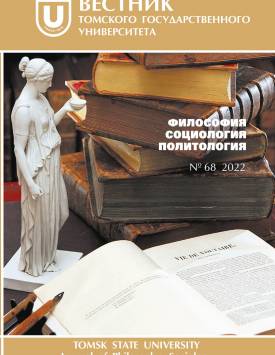On discursive character of historical language: Investigation of the backgrounds of relativism in analytical philosophy of history
The subject of the article is the study of the foundations of historical relativism that arose during the “linguistic turn” in analytical philosophy. The aim is to try critically analyze three theoretical propositions: 1. The prerequisites of historical relativism are already laid down in early analytical philosophy, in the criticism of the idea of universal history and universal methods of historical research; 2. There is a rejection of the idea of description in favor of the idea of representation, and, as a result, a plurality of interpretations is postulated; 3. The main theoretical achievement of historical relativism is the understanding of the historical narrative as a “story”. A new discursive understanding of the language of historians is emerging in the analytical tradition. According to judgments of supporters of historical pluralism in analytical philosophy, there is a certain ontology of history, the essence of which boils down to the assumption of an ineradicable diversity of communities, epochs and cultural formations in the history of mankind. The following distinction can be proposed: unlike supporters of pluralism, historical relativists introduce into history the idea of the randomness of socio-cultural phenomena, which entails an apology for the multiplicity of interpretations. The historical world turns out to be random through the prism of a certain historical language devoid of essentialist patterns. The pluralism of interpretations corresponds to the random multiplicity of historical formations. The criteria for the truth and persuasiveness of the historical interpretation no longer relate to the objectivity of the described event, but to the plausibility of the proposed narrative. An increase in the number of historical interpretations will not give tangible progress in the study. The pluralistic position seems to be more constructive, since, avoiding universalism, it does not exaggerate the fabrication of interpretations. Relativism turns out to be a paradigm, not a theoretical attitude; it is a metaphysical position. If we present history in the form of stories, then this entails the transformation of the subject of history itself. The historian seeks not to recreate, but to organize the past in a discursive form within the framework of historical relativists. The object of history is thereby transformed: history is not a description of events in the past, but the construction of a discourse about historical experience. The author declares no conflicts of interests.
Keywords
relativism, history, analytical philosophy, narrative, discourseAuthors
| Name | Organization | |
| Nikonenko Sergei V. | Saint Petersburg State University | serg_nikonenko@rambler.ru |
References

On discursive character of historical language: Investigation of the backgrounds of relativism in analytical philosophy of history | Tomsk State University Journal of Philosophy, Sociology and Political Science. 2022. № 68. DOI: 10.17223/1998863X/68/4
